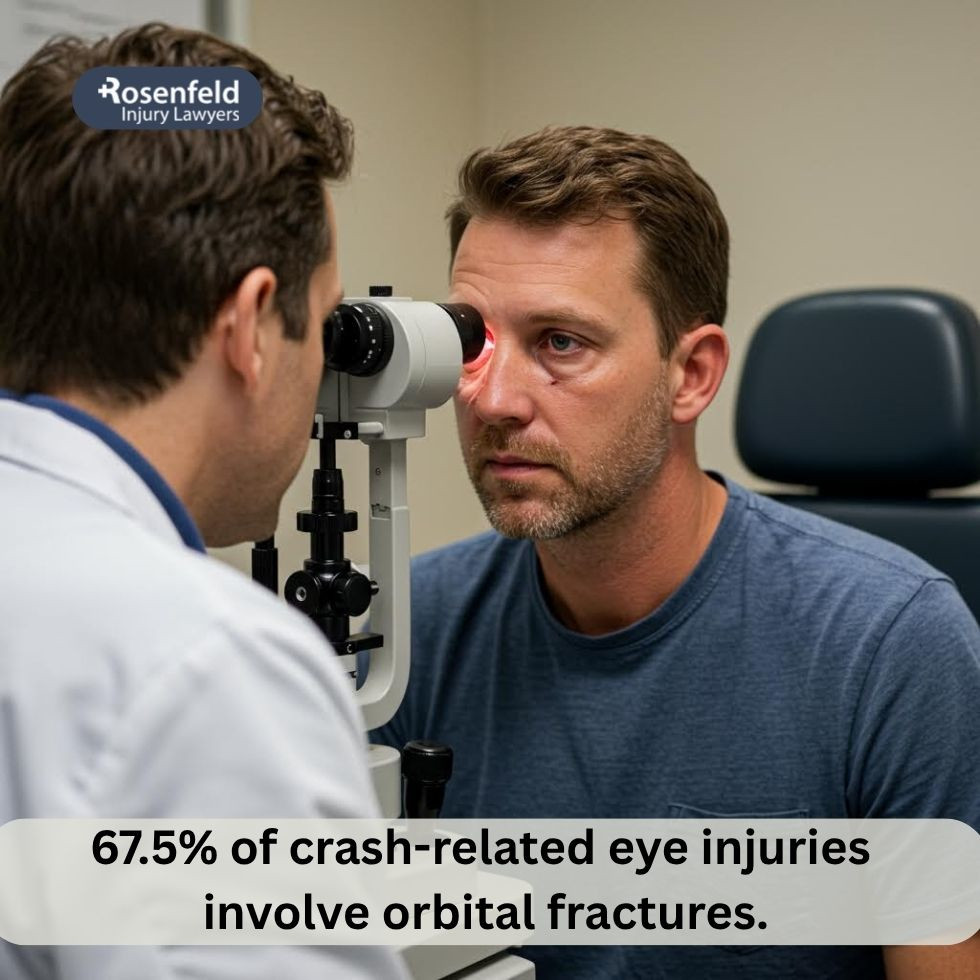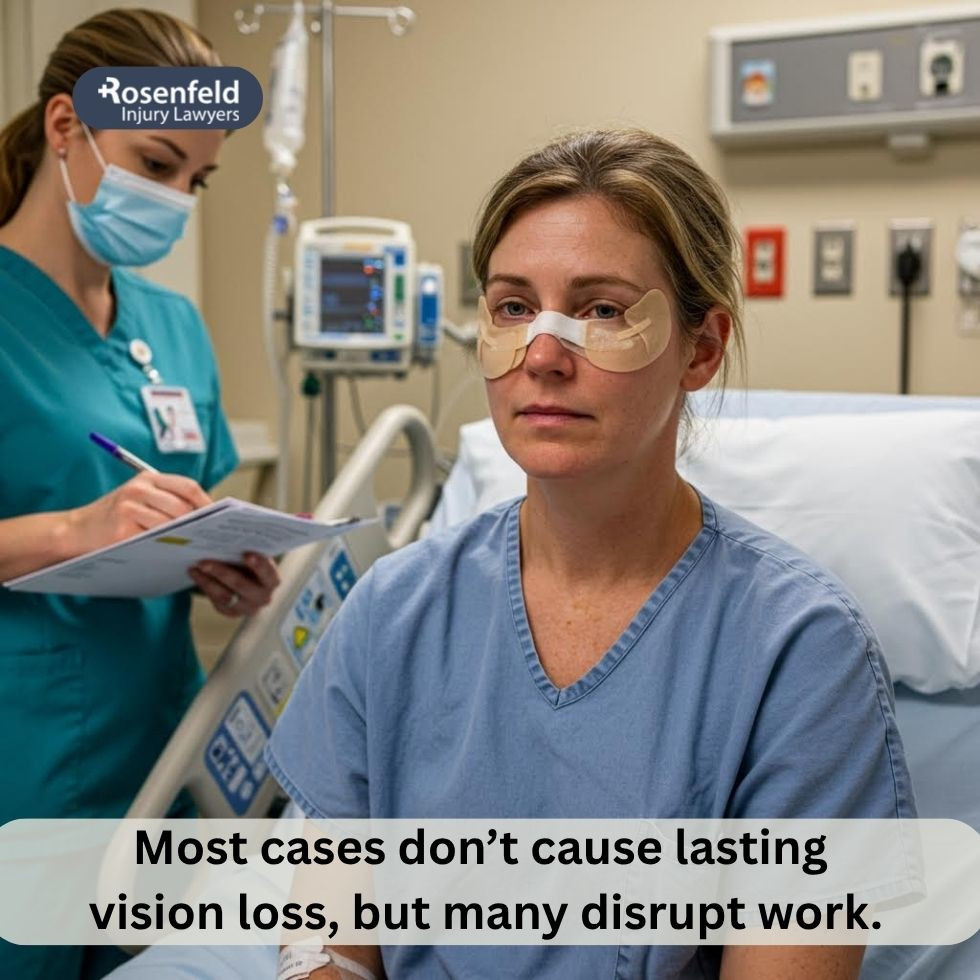- 24/7 Free Consultation: (888) 424-5757 Tap Here To Call Us
10 Most Common Eye and Vision Injuries in Car Accidents
Eye and vision injuries in car accidents have long-lasting consequences. Vision impairments from accidents can interfere with daily life, including your ability to work, drive, or enjoy activities you once loved.
According to the Illinois Department of Transportation, in 2023, Chicago experienced 101,023 motor vehicle crashes. Many of these occurred on busy roadways like Lake Shore Drive and the Dan Ryan Expressway – areas known for high-speed collisions that can lead to severe trauma, like eye injuries.
Understanding the causes, types of injuries, and treatment options is vital for proper medical care. It’s also critical to know your legal rights for compensation in such accidents.

How Car Accidents Can Cause Eye Injuries
Up to 10% of car accident victims suffer eye injuries, which can range from minor irritation to permanent vision loss. The impact from a crash can cause direct trauma to the eye or lead to secondary complications affecting optic health.
Common causes of eye injuries in car accidents include airbag deployment, shattered glass, exposure to chemicals, and sudden head movements impacting sight.
In many cases, these injuries can result from foreign body injuries like glass shards or debris from the crash, and untreated damage can lead to long-term complications.
10 Common Eye Injuries Caused by Car Accidents
Car accidents can lead to various eye injuries with varying degrees of severity. Here are some of the most common eye injuries caused by motor vehicle collisions:
- Corneal Abrasions
Corneal abrasions happen when broken glass, plastic particles, and other debris scratch the cornea. The injured part of the eye can cause pain, redness, and blurred vision. Since the cornea protects light-sensitive tissue, early detection and medical treatment are crucial. If left untreated, even small abrasions can lead to serious problems.
- Chemical Burns
Chemical burns from battery acid, leaking fluids, or airbag chemicals can damage the iris and surrounding tissue. These burns may lead to severe damage, optic nerve issues, or eyesight loss. If you are injured from chemical burns, immediate treatment is critical to avoiding lasting damage.
- Blurry Vision After a Car Accident
Blurred vision can result from corneal abrasions, head injuries, or even traumatic optic neuropathy. It may also be tied to swelling or pressure in the eye. A proper diagnosis is important to rule out serious damage and begin the needed care.
- Double Vision from Head Trauma
Double vision, or diplopia, may result from head injuries that impact the brain, eye muscles, or nerves against the dashboard or steering wheel. Since this condition typically indicates a deeper issue, such as a brain injury or broken bones around the eye, immediate medical attention is necessary to prevent permanent damage.
- Orbital Fractures
Blunt trauma to the face can cause orbital fractures—bone fractures surrounding the eye socket. Symptoms often include swelling, pain, and restricted eye movement. In some cases, patients also experience blurred sight or pressure around the iris or colored part of the eye. Severe fractures may require surgery to restore function and appearance.
- Hyphema
Hyphema, or bleeding in the eye, occurs when trauma leads to bleeding in the anterior chamber of the eye, between the cornea and iris. This condition raises intraocular pressure and may result in optic nerve damage without appropriate treatment. Head injuries are a common cause, and a quick evaluation is vital to reduce the risk of long-term complications.
- Retinal Detachment
Trauma can cause the retina to detach from the back of the eye, leading to flashes of light, floaters, and partial or total eyesight loss. Retinal detachment is a medical emergency and requires surgery to reattach the retina.
- Vitreous Hemorrhage
Vitreous hemorrhage, or bleeding inside the eye, occurs when blood leaks into the gel-like substance inside the injured eye, causing vision loss. While this may resolve on its own, it can also signal a more serious injury requiring surgery.
- Optic Nerve Damage
Swelling or bleeding in the eye after a car accident can lead to increased pressure on the optic nerve, which can lead to permanent blindness if not treated immediately. This injury often requires surgery or ongoing medical management.
- Brain Injuries Affecting Sight
Traumatic brain injuries (TBIs) or concussions can disrupt visual processing in the brain, leading to problems like sensitivity to light, dizziness, and the loss of peripheral vision. Problems from brain injuries require specialized treatment and long-term rehabilitation.

Seeking Medical Care For Eye Injuries in a Car Accident
If you experience eye pain or vision problems after a car crash, it’s crucial to seek medical attention immediately or go to an emergency room.
In Chicago, several hospitals, including Northwestern Memorial Hospital and Stroger Hospital of Cook County, specialize in emergency care for eye injuries.
Injuries to the eye, especially from blunt trauma or foreign objects, can damage tissue inside the eye or surrounding structures. If left untreated, these common eye injuries may lead to traumatic cataracts or permanent vision loss.
Medical treatment often includes emergency care, surgery for conditions such as orbital fractures, and ongoing therapy when the injury is linked to head trauma. Immediate medical attention and an early diagnosis play a critical role in preserving eyesight and preventing long-term complications.
The Cost of Eye and Vision Injuries in Car Accidents
Common eye injuries caused by car accidents can result in substantial medical expenses, including surgery, specialist visits, follow-up care, and long-term therapy. These costs can rise quickly, especially in cases involving related eye injuries.
Treatments may require eye drops, surgical intervention, or extended rehabilitation to address issues with eye coordination and movement caused by rapid changes in visual function.
The financial burden frequently includes lost wages if your ability to work is impaired due to vision loss. In addition to the economic toll, victims may also be entitled to compensation for pain and suffering tied to the emotional distress and life changes caused by eye injuries.
How a Car Accident Attorney Can Help After an Eye Injury
Insurance companies usually try to downplay the long-term impact of eye injuries. They may offer settlements that don’t fully account for the cost of ongoing treatment or the effect on quality of life. An experienced Chicago car accident lawyer can:
- Gather medical records and evidence to prove the severity of your injury.
- Negotiate with the insurance company to secure maximum compensation.
- File a lawsuit if necessary to recover fair damages for medical costs, lost wages, and pain and suffering.
Get Legal Help for Eye Injuries Caused by a Car Accident

If you or a loved one sustained an eye injury in a Chicago car crash, don’t try to navigate the legal process on your own. Contact our experienced car accident attorneys today for a free consultation. We’ll help you understand your rights, gather critical evidence, and fight for the compensation you deserve for your eye injury and other damages.
Contact us at (888) 424-5757 or fill out our form to discuss your legal options.
All content undergoes thorough legal review by experienced attorneys, including Jonathan Rosenfeld. With 25 years of experience in personal injury law and over 100 years of combined legal expertise within our team, we ensure that every article is legally accurate, compliant, and reflects current legal standards.







